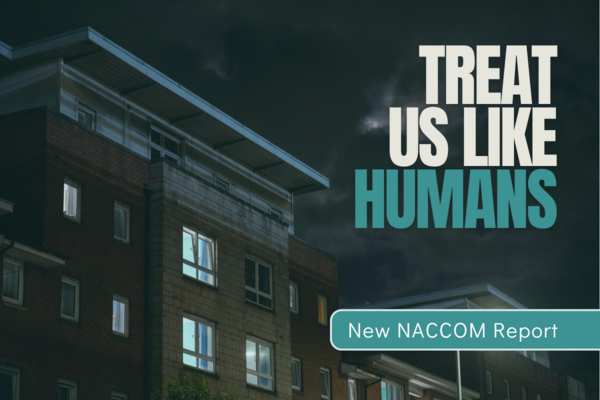A new report, "Treat Us Like Humans": A Report on the Lived Experience of the Asylum System, from NACCOM and the Good Faith Partnership explores what it's like for people navigating asylum accommodation and support services in the UK.
The research was based around three focus groups held between July and October 2024 in Manchester, Newcastle, and London. With the support of The Boaz Trust, Action Foundation, and Notre Dame Refugee Centre, these discussions provided a space for 30 people to share their firsthand experiences.
Overwhelmingly, the report points to systemic failings in the current model of asylum support and accommodation that undermines the dignity and wellbeing of people seeking asylum. This manifested in a number of ways, including:
- Inadequate housing conditions that fail to meet basic standards of safety and comfort.
The most striking example of this came from a participant who cares for his severely disabled wife and four children (p.5). During their first month in the UK, the family were moved multiple times into unsuitable hotels, and when an adequate room was finally found, they had to stay waiting there for more than two years. Eventually, when a house was found for them, they arrived to find again that the accommodation was completely unsuitable.
Over the whole process, the accessibility issues the family encountered included: doorways too narrow for a wheelchair to fit through, lack of accessible bathrooms, lack of a hoist, lack of a medical bed, lack of an accessible toilet and lack of an accessible shower or bath.
- Isolation and exclusion that leave people feeling uprooted and unable to maintain meaningful connections within communities.
Several participants described the negative impacts of being moved around between regions of the UK while seeking asylum. One participant powerfully describes this experience:
“And again, after 6 months of building this community around me [in Glasgow], they say okay you have to go, move, to Newcastle. And me I was okay with it, but everything goes back to zero, so six months of my life, went away because it is no use anymore. Those people, you met them, you are friends with them, but it’s done now. You have to go back to another city where you don’t know anyone…
When I came here, when you already left Syria, and you’ve already lost your friends there, then you find more friends, and other friends, and then you lose them again, you just feel like I’m not gonna do it again. You feel isolated again. You cannot choose where to go.”
- Barriers to accessing essential services like healthcare, education, legal aid and employment support.
Many participants said that having the right to work is something that would make them feel more welcome in the UK. However, even when people did have the right to work after receiving their status, many barriers to employment remained. Commonly, participants highlighted language as a key barrier, emphasising the importance of good ESOL (English for Speakers of Other Languages) provision for new arrivals.
This report shows how vital it is that we listen to the voices of those with living and lived experience of the asylum system when pushing for reform. Throughout resounds the simple yet powerful plea: “Treat us like humans.”





